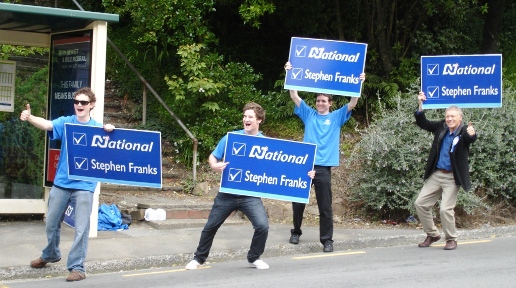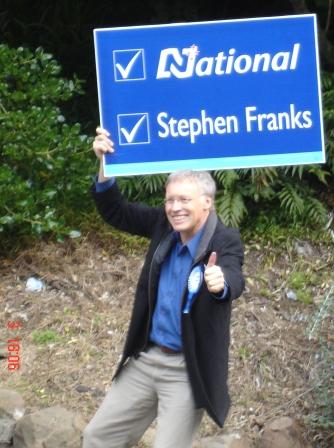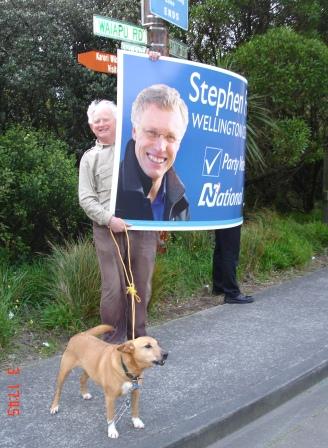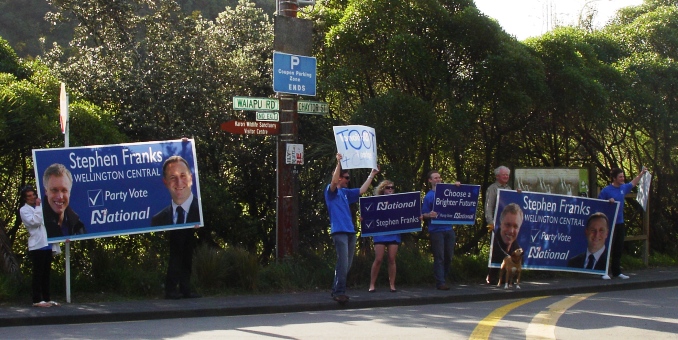Welcome
On this site you'll find posts and pages from recent years. The site began as part of my public law practice after leaving Parliament in 2005. Accordingly it records my opinions, not necessarily those of Franks & Ogilvie of which I am a principal, or any client, or the National Party for which I contested the Wellington Central electorate in November 2008.
From the Wellington Writers’ Walk:
“It’s true you can’t live here by chance, you have to do and be, not simply watch or even describe. This is the city of action,the world headquarters of the verb”
– Lauris Edmond, from The Active Voice
The acquittal of Tim Pankhurst and the DomPost seems to have been for a deplorable reason. The judges decided that the publication of the suppressed evidence was not contempt because it would be unlikely to affect the eventual trial.
"Though the articles would have had substantial impact at the time on a lot of people, and had clear potential to prejudice the minds of would-be jurors, the more difficult question was how much would linger at the time of any trial, which the judges thought would be at least two years later."
What a hopeless system, when top judges casually expect that criminal charges would take 2 years to get to trial.
From the DomPost report the law of contempt remains as unsatisfactory as before this prosecution. Randerson and Gendall JJ seem to encourage rather than discourage the use of suppression orders.
I posted on this case on 30 September, worrying that the outcome would be bad whichever way it went. It seems to me worse than I feared. The law is more obscure, suppression is encouraged, and in addition the judges treat as normal the quagmire that allows cases to take years when they should be over in a few months.
The decision is yet to be posted on the site for judicial decisions. I hope that the actual judgments are not as depressing as they sound.
On the other hand – great news for the news guys, and congratulation to their defence team.
That’s the great headline to the DomPost story of Raewyn Gardiner’s defence of her cakes.
It shows a great spirit, a great picture, a great outcome and its great advertising.
I must stop for one of those cakes.
The PREFU underscores the wasted opportunity represented by the last 8 years. The most sustained period of peace and favourable terms of trade in my working life has been squandered. Instead of using the good years to help mitigate the effects of tough decisions New Zealand has focused on paying bright people to make then enforce new rules for everyone else. Our productivity growth has stalled.
Just as in 1990 a National government is going to have to do the unpopular tidy-up to get things working again. Quite apart from the budget blow-out there’ll be the management catastrophes in Immigration, Health, Defence, Corrections, De-forestation, carbon foot-print and Kyoto, local government over-reach, house prices, and many others.
It reminds me of what happens when adults leave their silly kids for a weekend. When the adults return the fridge is empty, bottles lie everywhere, lots of stuff has been broken, the credit cards have been stolen, and it will take months to get the smell of drink and worse out of the carpets.
Stoners and other losers keep turning up at the door asking about the next party, and the kids whine when they’re told they’ll have to help with the clean-up and do their homework before they can go to another party.
I contrast our feckless government’s performance (despite its masterful political management) with how Chile has dealt with its period of commodity price boom. Chile has salted away US$10bn against the time when copper prices fall.
The sad thing for H Clark is that her legacy may be no better than that of Muldoon. Both had superb political management skills. Neither used them to take on any really worthwhile political leadership project. They could have used that political skill to do something hard, like reform welfare, or education. instead neither has reversed New Zealand’s relative decline when compared with our neighbours and competitors.
Truth in sentencing at last – life to mean life again in New Zealand after 50 years of judges being obliged officially to lie at every murder sentencing..
The policy to be announced today makes me proud. Proud of my years in Parliament puncturing myths about parole, drafting and moving amendments to government bills. Proud of my bill to end it, which did not get past first reading. Proud of my work with Garth McVicar.
I’m also grateful to the victims who’ve stood up to demand this simple justice for so long.
This commitment to restore integrity to sentencing, and to deliver for victims of our foulest crimes the elementary justice they’ve been seeking, would alone be enough reason for me to stand for National. Because National will be able to deliver.
Last night in Wellington Central thousands of volunteers’ dollars were trashed, as party and candidate signage was defaced or destroyed. On many sites the timber was smashed. Nearly all parties suffered.
We’ll spend around $800 repairing one night’s damage alone. I suspect that other parties together will spend more.
Our damage will all be repaired. We’ll buy new plastics and timber, screws and washers. Under the absurd workings of the EFA we could even get a small benefit out of that destruction as our timber is upgraded and the signs are changed.
On one theory the persistent damage to signs, and the consequent changes in them adds to their impact. People look to see what has happened overnight. And the Electoral Finance Act means we do not have to take into account in our spending cap the replacement costs.
Last night at least the only hoardings spared seem to have been Green.
Perhaps some idiot supporter thought it would cleanse the city for the Green launch here in Wellington today, but I’m sure it would embarrass them. I respect Sue Kedgely and such waste would be anathema to her. All parties attract people they could do without and the official Greens would deplore the vandalism, not least because last night’s debris, including the plastic, will end up in the landfill.
The right to try to persuade your neighbours who to vote for is rare in human history, and it is still a minority privilege in our world. People committed to active democracy will not be suppressed. So whatever the damage it is a point of principle to repair it.
Wellington has thousands of people with passionate views about who would best lead our country. They support many different parties. Many give their time and their money to help persuade less passionate neighbours . These attempts to suppress that communication add to the burden on such donors, but the EFA leaves more money available than will ever be spendable on signage.
I understand people who feel that hoardings do not persuade – they merely shout. Others just dislike signage of any kind. But I’ve also noticed the intolerance of some who express those views. They assume that anyone worth consideration shares their likes and dislikes.
Many people who will vote have still to realize there is an election. If they’re uninterested in media stories on politics, it is only the sprouting of signage that switches on their vague interest in finding out a bit more. The signage signals a competition. They may not be much interested in politics, but many of them do like competitive sport. Elections are a competition and signage is part of it. So the signage plays a vital part in generating participation.
So for those who do not like seeing the signs for 2 months out of the 36 in our democratic cycle, can you see it as a minor sacrifice to help engage your neighbours?
Elections are a precious rite, however less than perfect its outcomes. Vandalism will not suppress it. It simply makes the rite more wasteful.
Media are rightly celebrating the life of Austin Hemmings.
But I fear that we are making loud noises to drown worries, like the the worry that his death was meaningless, the worry that the evil abroad in our community is not matched by the forces against evil, the worry that evil will triumph when we no longer ensure that evil’s agents come off worse than its victims.
I’m prompted to this reflection by the contrast between the praise for Mr Hemmings, and the lack of interest in Varinder Singh. I want to know a lot more about Mr Singh’s case. I want to know why he is not already a media hero. I want to read interviews with bystanders. I want to know more than the standard police answers to queries.
I want to be reassured that the difference is not just that we prefer our heroes dead, or that our media value white heroes more than brown ones.
Mr Singh was one of the Otara liquor store owners whose defence of his store and his colleagues is now described by the police as a brawl.
Perhaps the evidence in court will show that he went too far beyond defending himself from the fate of others in his district this year. Maybe he did the unthinkable and was trying to defend his property instead of his life.
But for an understanding of why the police are losing the battle in South Auckland look no further than Det Sgt Dave Pizzini’s explanation.
If Mr Pizzini had no alternative but to charge Mr Varinder Singh, he should have made it plain it was in sorrow, not sanctimony, and that it should not discourage others from trying to uphold the law.
Only in a police state can policing be left to the police. In free societies the police and innocent citizens have the same powers, and the same excuses – the difference being that the police do full time what ordinary citizens do when confronted with law-breaking (see my ealier posts here and here).
It is long past time for the police to bury that stupid phrase – ‘taking the law into your own hands’. In our own hands is where the law always was, and must be. It must be something all of us are willing to uphold. In this stretched out land there will never be enough police to protect the weak from the strong if the police are the only ones trying. The law can only prevail when those tempted to prey on the weak know that the weak have behind them not just the police, but an entire community.
I went to a very enjoyable meeting last night with the tenants at Wellington City Council’s Arlington Flats.
It was warm and good natured with many thoughtful questions. Nothing on housing policy or rental problems – the ones I had expected – but instead we had questions on climate change, crime, health, the minimum wage, the role of capitalism, transport and foreign policy.
One lady asked about opening ACC to competiton. Her concern was the local Tai Chi class, funded at the apartments by ACC. Another asked about the fairness of the government focussing exclusively on families with children. As a single, middle-aged woman she believed she was costing the country much less.
We discussed why the Labour Government under Annette King is building a new hospital in Wellington that is smaller than the one it replaces, despite the aging population. The Labour candidate explained that people will be encouraged to go to their local doctors and therefore won’t be as sick! He also said more patients would be going to Kenepuru and Hutt Hospitals. If you’re hearing the stories I’m hearing of up to 10 hour waits at the region’s emergency departments you wouldn’t be convinced either.
The meeting was well organised by Ope Puketapu and her fellow executives of the Wellington Housing Association of Tenants.
By the Karori tunnel tonight.




Much effort has gone into the Cycling Advocates Network website. Their just announced page on the political attractiveness of candidates and parties is the kind of resource that should proliferate on the web.
It probably breaches the Electoral Finance Act because if it works as intended it will encourage or persuade voters to vote for particular parties and candidates.
I hope they stand up for their free speech rights and regard possible fines as a price worth paying.
As a keen cyclist I plan to join their inspection on 12 October of the proposed harbourside route from Petone to Kaiwharawhara.
One response to the spate of murders in South Auckland has been a proposal for law changes to reduce the number of alcohol sales outlets.
Restrictions should be good for established liquor outlets, but without research it is hard to know whether it would do more than increase their profits and limit the prospects of some dairies and supermarkets.
The same issue has been debated in the US. A new Urban Institute research report suggests there could be connections between numbers of outlets and violence:
The findings indicate that on-premise outlets [bars], but not off-premise outlets [bottle stores and dairies] are a significant predictor of aggravated assault.
Before attributing too much to this seeming rebuttal of the case for more restriction, note that the study urges much more fine-grained research before drawing policy conclusions, because "off premise" outlets seem to be associated with more domestic violence.
—
Next Page »



